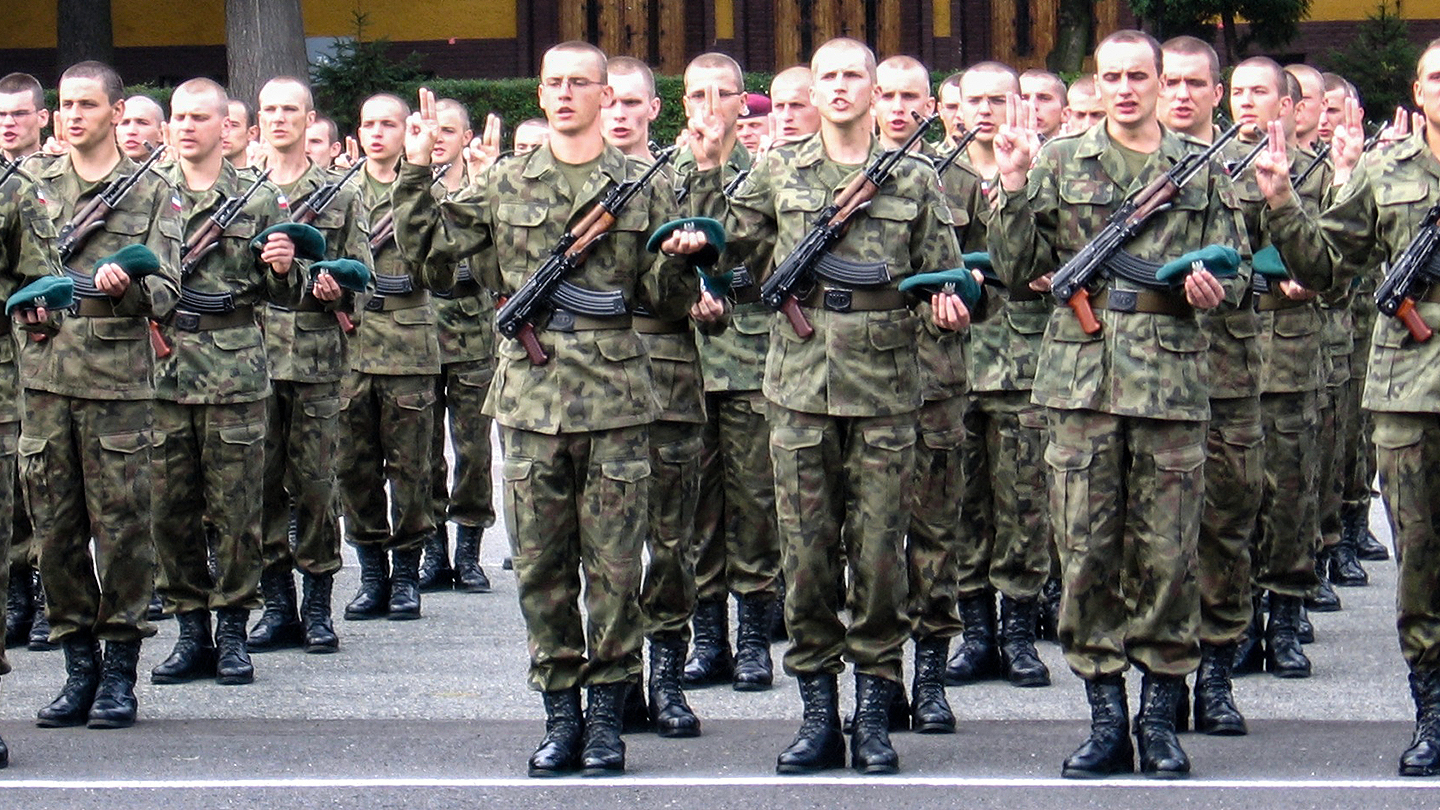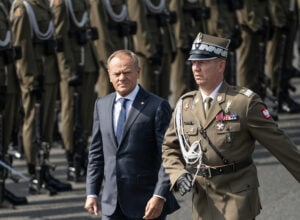Do większości elit politycznych obecna powódź dewastująca południowo-zachodnią Polskę stanowi element narracji politycznej. Dla koalicji rządzącej to moment na wykazanie się sprawczością organów państwowych, dla opozycji – idealna okazja na wytknięcie nieskuteczności rządu.
Pomimo imponującego zaangażowania służb mundurowych w przeciwdziałanie skutkom powodzi reakcja na klęskę żywiołową przypomina bardziej pospolite ruszenie aniżeli systemowe przygotowanie polskiego społeczeństwa do reagowania na zagrożenia zewnętrzne. Lewica Razem jest de facto jedyną partią w parlamencie, która opublikowała konkretne stanowisko dotyczące obronności państwa w 2023 roku. Jednakże ugrupowanie pod przywództwem Adriana Zandberga i Magdaleny Biejat wpada w tę samą liberalną pułapkę, co inne partie, kategorycznie odrzucając dyskusję nad powrotem do instytucji zasadniczej służby wojskowej bądź cywilnej.
Nie ma obronności bez odpowiedzialności
Politycy i polityczki Lewicy Razem często podkreślają kluczową rolę obowiązków obywatelskich w systemie obronności państwa. Powołanie oddziałów Służby Ochrony Cywilnej, podlegającej w czasie pokoju wojewodom, to konkretna propozycja, choć niestety niewystarczająca. Państwo polskie, zmagające się z coraz częstszymi kryzysami środowiskowymi oraz potencjalnym zagrożeniem militarnym ze strony Federacji Rosyjskiej i Republiki Białorusi, musi pogodzić się z potrzebą obowiązkowego zaangażowania wszystkich zakwalifikowanych obywateli w działania na rzecz budowania szeroko rozumianej odporności społeczeństwa.
Odpowiedzialności za bezpieczeństwo zbiorowe możemy uczyć się od naszych europejskich sojuszników. Państwa Skandynawii, Bałtyku, Austria czy Szwajcaria prezentują gotowe rozwiązania problemu zaangażowania obywateli w służbę poborową. Pomijając kraje bałtyckie, gdzie obowiązkowa służba wojskowa wynika z realnego zagrożenia zbrojną konfrontacją z o wiele silniejszym sąsiadem, w Skandynawii czy Austrii wynika ona z socjaldemokratycznego pojmowania obowiązków obywateli wobec państwa. W tychże państwach obowiązek odbycia służby wojskowej lub cywilnej wiąże się z przekonaniem o istotnej roli poboru w budowaniu solidarności społecznej, świadomości narodowej czy aktywnej partycypacji obywateli w działalność instytucji publicznych. W Szwecji czy Danii obowiązkowa służba przyczynia się do integracji osób o diametralnie odmiennych poglądach politycznych, poziomach wykształcenia czy pochodzeniu klasowym. Warto podkreślić, że z badań socjologicznych przeprowadzonych w Szwecji wynika, że poborowi nie tylko nie przeciwstawiają się obowiązkowi służby (odsetek objectorów nie przekracza 4 proc.), ale wyrażają szczere poparcie dla instytucji poboru.
Co więcej, Dania stała się trzecim krajem po Szwecji, Norwegii i Izraelu, gdzie poborem objęto również kobiety. Przełamuje to historyczne wykluczenie kobiet z obrony narodowej, zdominowanej przez mężczyzn. Z badań wynika, że kobiety odbywające służbę wojskową deklarują poparcie dla tego obowiązku. Skandynawskie poborowe podkreślają równouprawnienie płci, jak również równość wszystkich obywateli i obywatelek w wysiłku na rzecz dobra wspólnego.
Do wojny trzeba ludzi
Lewica Razem wydaje się mieć obiekcje wobec planowanej liczebności Sił Zbrojnych RP, prowizorycznie ustalonej na poziomie 300 tys. żołnierzy. Obecnie jednak Polska znajduje się w trakcie wojny hybrydowej prowadzonej przez Białoruś, a w zależności od wyniku inwazji Rosji na Ukrainę może znaleźć w bezpośrednim zagrożeniu militarnym ze strony sąsiada, który posiada armię liczącą o milion żołnierzy więcej niż nasza. Wypadałoby więc wykazać się pewną dojrzałością i pomyśleć, kto w razie konfliktu będzie Polski bronił. Imponująca pod względem skali modernizacja SZ RP musi iść w parze z budowaniem liczebności armii.
W tym kontekście przykład Ukrainy jest nam najbliższy. Wprowadzenie zasadniczej służby wojskowej po inwazji na Donbas w 2014 roku pozwoliło Siłom Zbrojnym Ukrainy na odpowiednią mobilizację, rotację i uzupełnianie jednostek liniowych. Co więcej, zasadnicza służba wojskowa umożliwia tworzenie lokalnych ognisk oporu oraz organizację ludności cywilnej. Chociaż trudno wyobrazić sobie żołnierzy niezawodowych operujących patriotami czy abramsami, to do obsługi gromów czy javelinów przyuczyć już można.
Nie da się jednak prowadzić współcześnie wojny bez odpowiedniego kapitału ludzkiego. Konstatacja ta wynika wprost z doktryny wojennej Federacji Rosyjskiej, która obecnie i w przyszłości prowadzić będzie konflikty hybrydowe i asymetryczne. W Ukrainie Rosja prowadzi wojnę, w której strategicznym celem jest wyczerpanie zasobów ludzkich, materialnych czy morale strony przeciwnej. Aby budować rzeczywistą odporność polskiego społeczeństwa, nie wystarczy spoglądać z zadowoleniem na sumy wydane na nowoczesny sprzęt wojskowy, bowiem stanowi on tylko jeden z elementów stanowiących o skutecznym oporze przed potencjalnym atakiem.
Nie trzeba „ganiać z karabinem”
Europejskie, a nawet globalne modele zasadniczej służby (nie)wojskowej jasno pokazują, że obowiązki obywateli na rzecz odporności państwa nie muszą skupiać się na służbie wojskowej. Izrael stanowi świetny przykład państwa, w którym osoby odmawiające służby wojskowej w IDF wzmacniają Sherut Leumi, czyli alternatywną służbę publiczną. Większość z 20 tys. osób rocznie zasilających służbę publiczną pracuje w państwowej edukacji, chociaż izraelskich poborowych można znaleźć też w administracji, szpitalach czy instytucjach pomocy społecznej.
Europejskie państwa z alternatywą dla poboru wojskowego radzą sobie bardzo dobrze. Austriackie Zivildienst, obowiązkowa 9-miesięczna służba cywilna, wciela poborowych w ochronę zdrowia, organizacje pomocy społecznej, a nawet służbę więzienną. W 2023 roku ponad 45 proc. zakwalifikowanych poborowych (15 tys. rekrutów) odmówiło służby w Austriackich Siłach Zbrojnych, wspomagając działalność administracji publicznej oraz innych sektorów publicznych.
W Szwecji, gdzie pobór przywrócono w 2023 roku, Agencja ds. Sytuacji Nadzwyczajnych otrzymała zadanie szkolenia szwedzkich objectorów w zakresie obrony cywilnej, w tym pracy w ratownictwie medycznym. Szwajcarscy cywile odbywają służbę w straży pożarnej czy policji, z kolei duńska służba obejmuje wolontariat na rzecz innych państw. Kraje z obowiązkową służbą wojskową oferują więc swoim obywatelom wachlarz możliwości w pracy na rzecz funkcjonowania i bezpieczeństwa swoich społeczności.
Wbrew pozorom pobór nie musi oznaczać „ganiania z karabinem”. Może wspomagać często niedoceniane sektory publiczne, jak edukacja czy zdrowie. Taki model mógłby zainteresować w szczególności posłanki Joannę Wichę i Paulinę Matysiak, bowiem europejscy poborowi nierzadko parają się pielęgniarstwem czy transportem publicznym, czyli sektoromami publicznymi wiecznie borykającymi się z brakami kadrowymi.
Skończmy z neoliberalną mentalnością
Zawieszenie zasadniczej służby wojskowej w Polsce w 2010 roku należy umiejscowić w szerszym, globalnym kontekście. Początki światowej fali profesjonalizacji armii miały miejsce w Stanach Zjednoczonych lat 70. Milton Friedman, szarlatan neoliberalizmu, w jednym z ostatnich udzielonych wywiadów wskazał na wycofanie poboru w USA jako na swoje największe osiągnięcie. Korzystając z analizy ekonomicznej, Friedman argumentował, że pobór jest skrajnie nieproduktywny, bowiem obywatele pozbawieni są możliwości wkładu w rozwój gospodarki, a efektywność niechętnych poborowych jest nieporównywalnie niższa niż żołnierzy zawodowych (chociaż argumenty Friedmana na co dzień obalają ukraińscy poborowi, obsługujący drony czy amerykańskie wyrzutnie Himars i haubice M777), którzy motywowani pobudkami ekonomicznymi będą bronić ojczyzny o wiele skuteczniej.
Jednakże pod płaszczem obiektywnych argumentów ekonomicznych zawarto jasno zdefiniowaną ideologię polityczną neoliberalizmu. Filozofka o etyce zbliżonej do Friedmana, libertarianka Ayn Rand, nazwała pobór najgorszym z „etatystycznych naruszeń praw jednostki”. Pod przykrywką nauk ekonomicznych ukryto argumenty moralne, dotyczące granic ingerencji państwa w życie obywatela. W 1973 roku triumf odniosły dwa ruchy kulturowe. Z jednej strony światowy kryzys paliwowy zapoczątkował wyparcie polityki keynesistowskiej na rzecz polityki zaciskania pasa, znanej z późniejszych rządów Margaret Thatcher, Ronalda Reagana czy Leszka Balcerowicza. Z drugiej, apogeum protestów przeciwko wojnie w Wietnamie doprowadziło do wycofania poboru w Stanach Zjednoczonych. Po upadku Związku Radzieckiego do odbudowującej się III RP zawitała ideologia neoliberalizmu, dominująca w naszej kulturze do dziś. O wpływie instytucji takich jak IMF czy Bank Światowy na polską transformację ustrojową napisano wiele, jednak rzadko wspomina się o tym, że wymagania dotyczące wstąpienia do Organizacji Traktatu Północnoatlantyckiego wymogły na polskich Siłach Zbrojnych cięcia budżetowe i masowe zwolnienia personelu, będące lustrzanym odbiciem terapii szokowej Balcerowicza. Aby zakwalifikować się do NATO, Polska musiała spełnić szereg wymogów dotyczących modernizacji technicznej, a zakupu nowoczesnego sprzętu wojskowego dokonywano kosztem żołnierzy zawodowych, emerytów czy remontu infrastruktury, znajdującej się wówczas w opłakanym stanie.
Lewicowo o poborze
Współczesna lewica może jednak korzystać z szeregu argumentów filozoficznych na rzecz poboru. Michael Walzer, uznany amerykański politolog i komunitarysta, dowodził, że obrona narodowa jest dobrem wspólnym, za którą odpowiedzialni są wszyscy obywatele, a obciążenia związane z obroną powinny być dzielone przez całe społeczeństwo, a nie jedynie przez tych, którzy otrzymują za to wynagrodzenie. Wizji równego podziału obowiązków obywatelskich wtórowali najwybitniejsi filozofowie polityki pokroju Johna Rawlsa, Jurgena Habermasa czy Charlesa Taylora. Podobnego zdania był Jean-Paul Sartre, który podczas wojny w Algierii argumentował, że walka za wolność, samostanowienie czy opór przed opresją stanowią moralną obligację.
Jednakże państwo nie może odbierać prawa do decydowania o życiu i zdrowiu obywateli i obywatelek. Stąd nowoczesne systemy poboru kładą tak duży nacisk na alternatywę w postaci służby cywilnej. Ci, którzy z pobudek politycznych, etycznych, czy religijnych do wojska zawitać nie chcą, powinni mieć prawo do służby na rzecz dobra wspólnego w inny sposób.
Aby pobór spełniał swoją podstawową rolę w wyrównywaniu obowiązków obywatelskich, nie może on replikować nierówności społecznych istniejących poza tą instytucją. W nieprzemyślanej instytucji poboru osoby o wyższym wykształceniu lub statusie finansowym otrzymują bezpieczniejsze stanowiska od obywateli gorzej usytuowanych, stających się „mięsem armatnim”. W niektórych aspektach, problem ten jest trudny do rozwiązania – ciężko wysyłać na pierwszą linię frontu chirurga, tylko aby udowodnić, że wszyscy są równi.
Istnieją jednak systemy poboru, w których nierówności społeczne są eliminowane na tyle, na ile jest to możliwe. W Izraelu, każdy poborowy przechodzi szereg testów fizycznych, psychologicznych oraz rozmów kwalifikacyjnych w ramach systemu Tsav Rishon. Taki system pozwala wykluczyć cywilny status społeczno-ekonomiczny poborowego. Aby dostać się na kurs oficerski, poborowi muszą otrzymać daną liczbę punktów z testów psychometrycznych, oceniających między innymi zdolność do podejmowania decyzji czy logicznego myślenia (w odróżnieniu od Polski, gdzie do kursu oficerskiego uprawnia jedynie posiadanie tytułu magistra). Chociaż daleki od ideału, taki system pozwala na wyrównywanie różnic klasowych wśród rekrutów, minimalizując wpływ pochodzenia na stanowisko w hierarchii wojskowej.
Na razie wystarczy przełamać lody
Trudno sobie wyobrazić, z jakimi zagrożeniami mogłaby zmagać się Polska, gdyby w NATO nie była, szczególnie obserwując inwazję Rosji na Ukrainę. Warto jednak przynajmniej pochylić się nad tezą, że wycofanie poboru było (i jest) elementem globalnej ideologii, z którą „prawdziwa” lewica walczyć powinna.
Dla lewicy dyskusja nad zasadniczą służbą wojskową lub cywilną może okazać się nieoczywistym lecz definiującym postulatem programowym. Na instytucji nowoczesnego poboru można budować solidarność społeczną, świadomość narodową czy integrację różnych środowisk klasowych. Co najważniejsze, lewica mogłaby zamanifestować dojrzałość polityczną, akceptując, że dbanie o dobro wspólne wymaga nie tylko ambitnej polityki państwa, ale również zaangażowania ze strony obywateli.
Potencjalna deklaracja przywrócenia poboru miałaby zgubny skutek dla poparcia stałego elektoratu „kawiarnianej lewicy”, którego propaństwowość nader często występuje w formie bezobjawowej. Abstrahując od środowiskowej niechęci do wojska, wstręt przed jakąkolwiek obowiązkową służbą wobec państwa jest rozczarowującym przykładem liberalnej tożsamości wyborców lewicy. Jednakże postulat poboru mógłby być przekonujący dla wyborców spoza lewicowej bańki, chociażby tych, którzy oburzeni byli likwidacją projektu budowy CPK. Deklaracja dotycząca poboru mogłaby stanowić o ambitnym zaangażowaniu lewicy w konstruowanie spójnej wizji społeczeństwa obywatelskiego z lewej strony politycznego spektrum.
Parafrazując Beatę Szydło: Odwagi, Lewico!
**
Mateusz Kacperski – absolwent historii na Oksfordzie, gdzie obronił pracę licencjacką na temat ideologii neoliberalizmu w Wojsku Polskim po transformacji ustrojowej. Pracuje w sektorze zbrojeniowym, gdzie reprezentuje zagraniczne firmy w procesie modernizacji technicznej Sił Zbrojnych RP. Niedawno odbył dobrowolną zasadniczą służbę wojskową.

 Wspieraj
Wspieraj 

 Wspieraj
Wspieraj  Wydawnictwo
Wydawnictwo 
 Zaloguj się
Zaloguj się 















